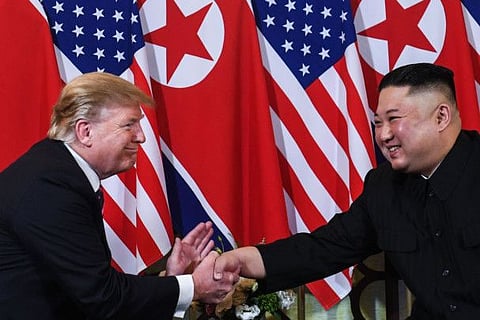One year from Singapore: Will US-North Korea talks collapse or continue?
To secure a deal with Pyongyang, Trump’s team needs to raise its game

Donald Trump said Friday he was in “no rush” to make a deal with North Korea, on the one year anniversary of the landmark Singapore summit, perhaps the US administration’s signature foreign policy initiative to date. Amid much White House hype, the process has predictably failed to live up to its billing with the talks just as likely to collapse completely, than see a deal agreed, which could now have dangerous, unpredictable consequences.
The reason why this was — potentially — foreseeable is the significant expectations gap that emerged out of last June’s event. What was no more than a start to a potentially transformational, sustained strategic dialogue, saw Trump, for instance, declaring that the “nuclear threat from North Korea is over” giving the impression that he had already completed the immensely complicated process of de-escalating tensions in the world’s last Cold War-era frontier.
Going forward, the US president still appears outwardly optimistic about the process insisting Kim Jong-un wants an agreement. Yet a significant part of this, however, rests on the president’s inflated assessment of his personal abilities to broker a deal. Beyond this self-deception, Trump remains very dependent on the shifting-sands geopolitics of the Korean peninsula turning in his favour again. Here, despite assessments of the US intelligence community to the contrary, he is grasping at the straw that Kim Jong-un may still be persuaded to denuclearise in a much more comprehensive fashion than yet offered.
After Vietnam, North Korea disputed Trump’s account that the reason the talks collapsed was because Kim asked for full sanctions rollback.Andrew Hammond
With Trump’s 2020 campaign cranking up gears, perceptions of such a foreign policy victory could provide political tail wind for him in what could be a gruelling election. And, with no other obvious international achievements on the horizon, save for the diminishing prospect of a big trade deal with China, he therefore has some incentives to double-down on courting Kim.
Breakthrough not ruled out
Yet, while an unexpected breakthrough certainly cannot be ruled out, the mood music surrounding the talks appears to be changing significantly. In Vietnam, there were clear differences between the two sides, especially over the scope and pace of denuclearisation and sanctions rollback, exposing the lack of prior US planning and political risk in holding the second summit. Perhaps the nearest recent US parallel to the complexity and tough nature of the talks with Pyongyang is those conducted by the Obama administration over the Iran nuclear deal which took years.
Remarkably, even today it is still not clear that the Trump team has a comprehensive, clear or coherent strategy towards Korea which continues to contain much complexity for the president around US alliances, the non-proliferation regime. Not to mention what exactly would constitute the fundamental issue of “denuclearisation” on the peninsula.
As in 2018, the chief issue for the White House to resolve is what sequencing will be necessary to move the process forward. After Vietnam, North Korea disputed Trump’s account that the reason the talks collapsed was because Kim asked for full sanctions rollback. Pyongyang claims that it asked for only partial sanctions relief, and that an offer was made to permanently halt nuclear and long-range rocket testing.
Kim on higher ground
Whatever the truth of this, one reason why Pyongyang may not move far or fast in its positioning is that, to date at least Kim, rather than Trump, has emerged as the bigger winner from the process. The North Korean leader has made few concrete concessions to the United States, even recently recommencing missile testing.
At the same time, the US president has called off joint military exercises between US and South Korean forces; held out the prospect of an easing of sanctions on Pyongyang if it does “something meaningful” on denuclearisation; and already said that he hopes to meet again with the North Korean leader for a third meeting. And this in a context too where there is also reported evidence that North Korea is continuing uranium enrichment and has stepped up missile production.
This underlines how much Kim has already received from Trump in exchange for the ambiguous pledges to “denuclearise”. On a personal level, for instance, the young head of state has assumed significantly higher political importance on the international stage.
Also Read: Could Putin-Kim summit be ‘game-changer’?
The contrast between this, and the situation in 2017 when the Trump team was debating a pre-emptive attack is striking. Yet, the remarkable turnaround since then now looks very fragile again with potential key downside risks in play that could re-escalate tensions. Here, the personal and political volatility of both leaders cannot be underestimated, especially if Kim ultimately is seen to renege on any fundamental pledges in the US president’s eyes.
In particular, Trump remains under potential domestic political pressure having drawn a political ‘red line’ over Pyongyang having nuclear weapons capable of striking the US homeland. And here he is well aware that missile tests in 2017 showed Kim is close to developing a nuclear warhead capable of being fitted on to an intercontinental ballistic missile that can strike the United States.
Taken overall, while the Trump-Kim talks are in the deep freeze, historic change could still be in the air. To seize any remaining window of opportunity, the president’s team needs to raise its game otherwise it is now as likely to emulate previous administrations which failed to bring sustained, peaceful outcomes to one of the key challenges facing Washington and the wider world.
Andrew Hammond is an Associate at LSE IDEAS at the London School of Economics



